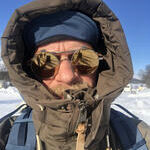Joel, här kan vara av läsintresse för dig:
http://www.ajcn.org/content/90/5/1193.full.pdf+html
De som studeras är ändå inte på så hög höjd som diskuterats här... ändå verkar inte ökat energiintag och/eller kolhydrat påverka kvävebalansen. Vilket jag egentligen tycker är det rimligaste antagandet - att ökat kolhydratsintag borde vara muskel- och kroppsviktbesparande på höghöjd, men icke.
"In summary, at high altitudes, increases in energy intake with
a palatable and practical carbohydrate dietary intervention does
not preserve residual mass (protein and glycogen). Also, there is
no sparing of a body-composition component via utilization of
stored energy (ie, being fatter at the start of an expedition will not
preserve your residual mass). These data suggest that mechanisms
other than energy availability must be responsible (at least
in part) for the loss of the functionally important residual mass
(protein and glycogen). Our findings suggest that preparation for
high-altitude exposure should involve increases in fat-free mass
without increases in fat mass. Anabolic exercise, as opposed to
increases in nutrient intake, seems essential."
Macdonald et al. Am J Clin Nutr 2009;90:1193–202.









